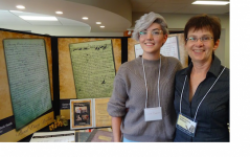Rural History at Guelph
Rural History Roundtable Winter 2017 schedule is here!
“Fashioning Place and Self in the Life Writing of a Nineteenth Century Newfoundland Mercantile Family”
Angela Duffett, PhD Candidate, History Department, Queen's University - Thursday, 2 February, 4:00-5:30 PM
"The Heroics and Poetics of Interwar Medicine: Country Doctor Stories from Cape Breton and Maine"
Sasha Mullally, Associate Professor of History, University of New Brunswick & President, Canadian Society for the History of Medicine - Thursday, 16 Feb, 4:00-5:30 PM"
“On-Reserve Indigenous Women Organizing for Change: The Saskatchewan Indian Women’s Association, 1971-1980”
Allyson Stevenson, Aboriginal Post-Doctoral Fellow, History, University of Guelph - Friday 3 March 2017, 4:00-6:00 PM
“Steers, Roping, and the Myth of Endless Bounty at the Rodeo, 1880-1910”
Susan Nance, Department of History, University of Guelph - Thursday, 23 March, 4:00-5:30 PM
All welcome! All Roundtables this Winter take place in MacKinnon 132. See our Events feed for more information.
 Rural Diary Archive
Rural Diary Archive
On September 24th, the Rural Diary Archive celebrated its first anniversary. To date volunteers have transcribed 1,630 diary pages in this ongoing crowdsourcing project.
Webmaster Julia Barclay is a third-year history student and busy uploading additional diaries from across Ontario for people to read, search and transcribe online. Cathy Wilson, Founder and Director of the project, will be speaking to several groups in Wellington County this year as we now have 24 diarists from the County. Check out our diaries for 1867 as we approach Canada’s sesquicentennial.
photo: Julia Barclay and Cathy Wilson present the Rural Diary Archive at Wellington County’s Harvest Home
RURAL VOICES: An Oral History Project Sponsored by the Francis and Ruth Redelmeier Professorship in Rural History
RURAL VOICES is currently looking for individuals who will share their stories with our researchers.
This project will record the life experiences of Canadian men and women who have contributed to rural society whether by maintaining the household and raising the next generation or through agricultural development, business ventures, community involvement and academic scholarship. The interviews will be deposited in the University of Guelph Archival and Special Collections to enhance one of the finest collections of rural life in the country and provide the evidence for future research into agriculture, daily life, rural and local history.
If you are willing to participate, your two hour tape-recorded interview will contribute to a greater understanding of rural life. Oral testimony is an important compliment to surviving written and published sources, and sheds light on experiences not often otherwise recorded. Your interview and other interviews will help us to be better informed about our environment, food supply, the family farm and rural community. They will demonstrate that rural experiences and perspectives are complex, diverse and changing.
If you are interested in participating in this project, or have any questions, please contact Brandon Mendonca at bmendonc@uoguelph.ca.
Studying – and serving – rural communities has been a core orientation of the University of Guelph since its origins as an agricultural college. The Department of History has long shared this interest, as was recognized in 2002 by the establishment of the Canada Research Chair in Rural History. Today a number of historians (faculty and graduate students) are pursuing research on rural subjects in widely varied contexts.
Until quite recently, most people lived in rural settings. Yet most history has been written from the perspective of town-dwellers. Often, the rural world has been less understood than stylized, as a contrast, good or bad, with the city: if the urban is dynamic, the countryside is static; if the urban is progressive, the rural is traditional; if the urban is bad, the rural is good; if the city is artificial, the rural is natural. Research in rural history at the University of Guelph aims to transcend simplified views and distortions about the past. Guelph’s historians and their colleagues seek to understand rural men and women, families and communities from their own viewpoints, as they sought to shape themselves and their society. Rural history here includes farming and agriculture, but encompasses the whole history of (and images of) rural society, politics, economy, and institutions.
Visit the Rural History at Guelph website and on Facebook!
Rural History at Guelph - affiliated faculty
Terry Crowley, Professor Emeritus
Margaret Derry, Adjunct Professor
Kris Inwood, Professor (cross-appointed to Department of Economics)
Kevin James, Professor
Femi Kolapo, Associate Professor
Douglas McCalla, Professor Emeritus
Stuart McCook, Associate Professor
Catharine A. Wilson, Professor
 Rural Diary Archive
Rural Diary Archive